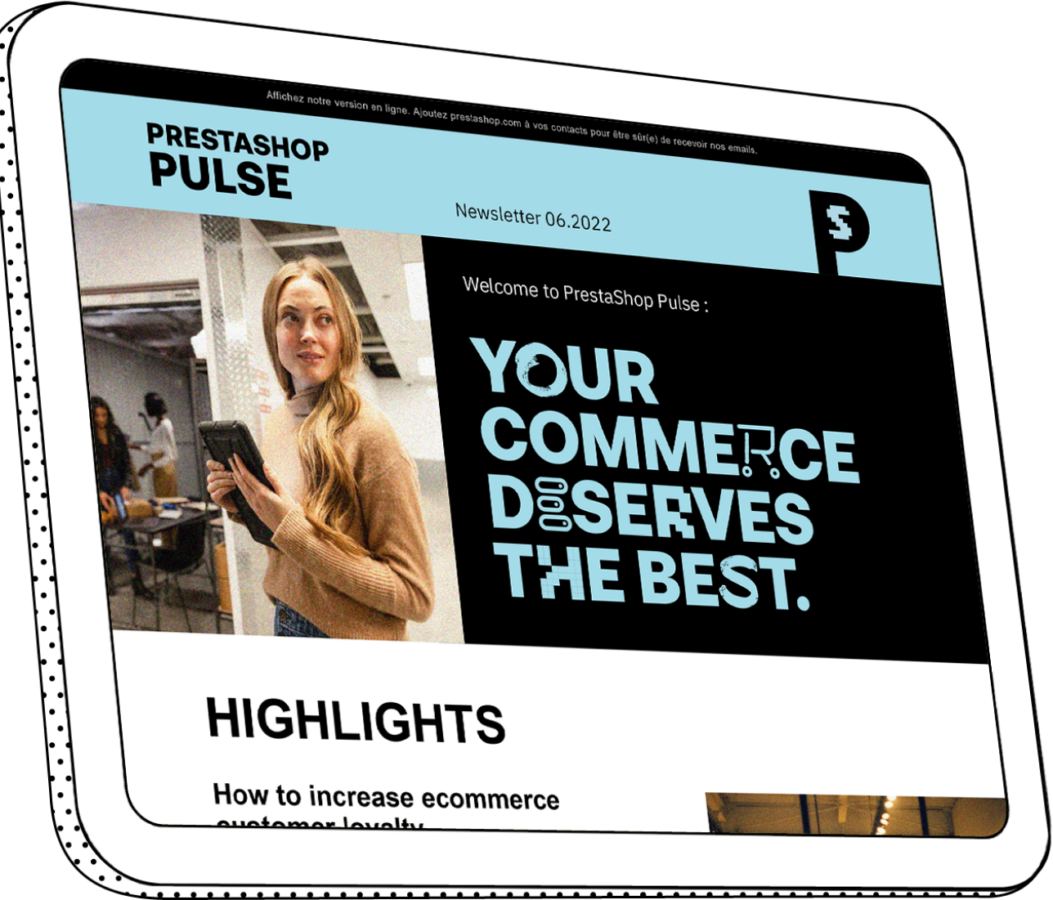
The 7 best ecommerce platforms of 2025
Launching an online store is, in part, like opening a store on a busy street. In addition to a good location, an attractive shop window and a solid system for managing sales, stock, and payments are also essential. Except that online, this "location" takes the form of an ecommerce platform. With a multitude of solutions available, the choice can quickly become a headache. So how do you find the one that's just right for your project, without exceeding your budget or limiting your ambitions? That's the purpose of this article, which reviews the essential criteria, the features not to be overlooked, and the ecommerce platforms that are well worth a look.
Criteria for choosing the ecommerce platform that fits your needs
Before diving into the main topic, ask yourself a simple question: what exactly do you expect from your platform? Depending on whether you sell physical products, courses, subscriptions, or services, your needs will be different. Even if you’re just starting out, your ambitions don’t have to be modest. In fact, choosing a solid platform from the beginning can help you avoid an expensive migration later on.
The essential features of an ecommerce platform
Not all platforms offer the same level of requirements when it comes to building ecommerce sites. Some only provide basic features, which are enough for occasional use, while others include advanced tools designed for professionals.
The first essential feature is product and service management. You need to be able to create detailed product pages with variants, options, inventory management, channel-specific visibility, or even special pricing for certain customer segments. A good platform should also allow for smooth and fast searching within your catalog, optimized navigation for the end user, and effective filtering tools.
The second must-have feature is order management. In this area, being able to track, filter, export, and notify your customers at every stage of shipping is key. The ability to send automatic invoices and easily connect your store to a logistics or delivery tool is another welcome convenience.
Next comes the marketing aspect, which is the cornerstone of your sales and conversions. Reliable platforms offer many tools like abandoned cart reminders, customer reviews, and buyer segmentation to make your marketing campaigns easier. Ideally, all these features should be easy to activate, without requiring heavy development work.
Mobile compatibility is now much more than just another feature. It is a non-negotiable requirement for any online store. Most of your customers shop just as much on their smartphones as on their computers. According to Statista data, sales made on smartphones reached $2.2 trillion in 2023, which is 60% of all ecommerce sales worldwide. This steady growth does not seem to be slowing down. In 2018, this channel accounted for only 56%, and it is expected to surpass 62% by 2027.
Having a reliable mobile app for your online store, or at least a responsive back office, is now essential.
You also should not overlook how well the platform connects with your existing operational environment. If you already use an ERP, a point-of-sale system, or accounting software, make sure the platform offers modules or an open API so you can integrate them easily.
Choosing an ecommerce platform: the growth support for your business
More than just a sales tool, a good ecommerce platform is above all a development lever. How can you be sure? Generally speaking, the platform should support your ambitions without limiting you. To talk about a specific feature, scalability is a key element. An effective ecommerce platform must be able to evolve with your business model, product range, or distribution strategy.
For example, if you open an online store to complement your physical point of sale, your platform should allow you to synchronize inventory, sales, and customers, regardless of the channel used. Unified commerce becomes an essential selection criterion in this case.
Another example: a merchant who starts with a range of artisanal products sold online, then wishes to diversify, hire a team, sell abroad, or integrate with a marketplace. Here again, the platform must be able to keep up with features adapted to this new business model: multi-user management, multilingual back-office, configuration of VAT rates by country, compatibility with international payment providers.
Once again, it's not necessarily about finding the perfect platform in absolute terms, but rather finding the one that suits your business and your needs. Some projects evolve quickly and require, for example, fine management of permissions, administrator profiles, or even validation workflows. Others focus on advanced content or SEO strategies, which require complete control of HTML code, SEO tags, technical performance, and URL structure.
A platform designed to last anticipates future needs, maintains flexibility, simplifies the addition of new tools, and supports your growth without having to rebuild everything.
List of the best ecommerce platforms
Not all platforms are created equal. Some are designed for freelancers, others for large companies. Some focus on simplicity, others on customization. Without further ado, here is our selection of the most recognized ecommerce platforms on the market.
PrestaShop
Open source solution, PrestaShop is entirely dedicated to ecommerce. Without mandatory subscription, the platform allows you to create a customized online store with full access to the code and a wide library of modules.
The ecommerce platform adapts to both small projects and stores with international ambitions. Its clear back office, multi-store capabilities, compatibility with numerous payment methods, as well as its logistics modules make it a particularly comprehensive choice.
PrestaShop also offers a large ecosystem of agencies, developers, and experts capable of supporting you. Whether you need a showcase site with a few products or a complex multilingual catalog, you'll find everything you need to build a customized solution.
Regarding the price of a PrestaShop store, this will depend on many parameters according to your needs and technical skills in particular. However, note that the Classic subscription is free (excluding hosting and domain name fees) and the Hosted subscription starts from €24 excluding tax per month.
To learn more about the differences between PrestaShop and other platforms, you can consult our various comparative articles: PrestaShop vs WooCommerce, PrestaShop vs Shopify and PrestaShop vs OpenCart.
WooCommerce
WooCommerce is an extension of the WordPress CMS. For this reason, the platform will mainly suit users who are already somewhat familiar with the WordPress ecosystem. Installation is simple and getting started is quick for small catalogs. One of its main advantages lies in its very active community.
You will easily find documentation, forums, or even specialized developers capable of customizing your store according to your needs. This makes it a popular choice among web professionals.
However, WooCommerce requires constant vigilance regarding security, backups, and compatibility between WordPress updates and those of plugins. This is far from a minor detail in an ecommerce environment, where a technical error can quickly have business consequences.
This ecommerce platform remains a serious option for small projects or beginners who want to get started quickly, provided they are aware of its limitations.
Adobe Commerce (Magento)
Formerly known as Magento, Adobe Commerce positions itself as a premium solution for ambitious businesses, particularly in the B2B sector, large-scale retail, or for very large catalogs.
Its technical robustness allows it to handle tens of thousands of products, with complex business logic such as tiered pricing, business accounts, or management by customer profile. Few platforms match this level of native detail.
However, this power comes at a cost. In addition to licensing fees, hosting and development require strong technical expertise. This is a platform aimed more at large, well-established organizations with a substantial budget and a dedicated maintenance team.
Shopify
In recent years, Shopify has established itself as the go-to solution for people who want to launch a store without any technical knowledge.
Its user-friendly interface, polished themes, and included hosting make it a popular platform for small online shops. Shopify's success also relies on its ecosystem of paid apps and themes, which allow you to launch a store in just a few hours, with no coding skills required. This plug-and-play approach also explains its growing popularity among brand creators and influencers.
However, this simplicity has its downsides. Every advanced feature requires a subscription or the purchase of an app. Monthly fees can quickly add up, and customization is often limited by the platform's constraints.
Another point to note: Shopify's servers host your online store's data, with no easy way to migrate it to another platform. This lock-in can be problematic if you want to move to a more flexible system later on.
Shopify remains a good choice for testing an idea or selling a few products. That said, the platform can become restrictive as you try to stand out or bring certain functions in-house.
Wix
Wix allows you to create a visually appealing site thanks to its drag-and-drop editor. Adding a store is simple and immediate. Wix’s strength lies in its speed of implementation. In just a few clicks, you can offer products, accept payments, and publish your site.
These features may be sufficient for occasional use or a sole proprietorship. However, its ecommerce module remains secondary. The platform is suitable for those who do not need complex logistics management or specific technical integrations.
For scalable projects, other platforms will offer greater functional depth. Wix also does not offer advanced tax management or advanced SEO features, which is a significant limitation for ambitious or international projects.
Squarespace
Less popular in France, Squarespace focuses on design and ease of use. Squarespace shares a similar philosophy to Wix, with a stronger emphasis on minimalist design.
The platform offers clean templates and a smooth user experience, although the ecommerce features remain limited to the essentials. The simplicity of editing and the quality of the visual rendering make Squarespace a popular choice among photographers and graphic designers who want to sell products or services online with a beautiful presentation.
However, this tool is mainly aimed at those who sell only a few items or who are looking for a professional look without having to go through a developer. The lack of advanced logistics connectors or B2B features makes it a platform with a primarily aesthetic purpose that will not suit more traditional online stores.
BigCommerce
BigCommerce is a credible alternative to Shopify, especially for businesses looking for an all-in-one SaaS solution but with more control over business rules and product catalogs. It offers a wide range of built-in features, including complex promotion management, advanced SEO, omnichannel integration, and compatibility with the main ERPs on the market.
This SaaS solution is more technical than Shopify but also more flexible in some cases.
BigCommerce is not widely used in France, which can sometimes limit the choice of agencies or modules tailored to the local market.
However, this platform is worth considering if you are targeting the United States or an international audience. On the other hand, the language barrier (documentation and support are in English) can be a challenge for teams that are entirely French-speaking.
Other platforms to explore
Some platforms like Shopware (popular in Germany), Ecwid (a specialist in lightweight multichannel sales), or OpenCart (minimalist but customizable) can be a good fit for very specific use cases. Choosing one will often depend on your existing ecosystem or your team's digital culture.
Conclusion
As you can see, there isn’t a single right answer when it comes to choosing the ideal ecommerce platform. It all depends on your project, your resources, your growth strategy, and your level of technical expertise. The only real mistake would be to pick a solution “by default,” without doing your research first.
Even simple platforms can become limiting, while powerful ones can turn out to be expensive and unnecessary if you don’t use them to their full potential. In this context, PrestaShop stands out for its ability to offer a robust, scalable, customizable, and accessible solution. Keep in mind that a platform isn’t everything. But if you choose the right one, it can make all the difference.
YOUR ECOMMERCE. YOUR RULES.
PrestaShop is an open source ecommerce platform that is fully customizable, adapted to the growth of your online store and the needs of your customers.





